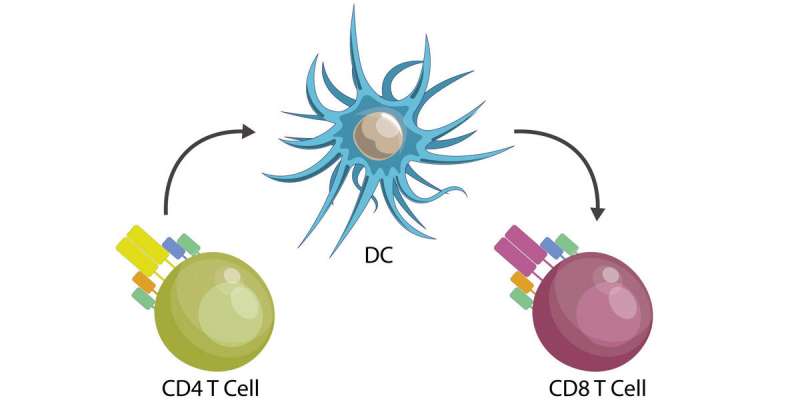This article has been reviewed according to Science X's editorial process and policies. Editors have highlighted the following attributes while ensuring the content's credibility:
fact-checked
peer-reviewed publication
proofread
T helper cells determine the course of disease in viral infections such as COVID-19: Study

People around the world have been infected with the SARS-CoV-2 virus for more than three years. It quickly became apparent that killer T cells play a crucial role in fighting the virus in the body by killing off infected cells. However, it was not entirely clear how the immune system manages to activate the defenses in a targeted manner and then calm them down again once the job is done.
An international team, including scientists from the Berlin Institute of Health at Charité (BIH) and the Charité—Universitätsmedizin Berlin, has now come a decisive step closer to understanding this phenomenon. The researchers have published their findings in the current issue of the journal Nature Immunology.
T-killer cells, also called CD8+ T cells because of their surface molecule, play a crucial role in our body's defense against viruses. They recognize virus-infected cells and destroy them, thereby preventing the virus from multiplying and infecting further cells. However, to fulfill this task, CD8+ T cells rely on other cells and molecules: Only when they receive the appropriate combination of signals, they are enabled to kill infected cells—and subsequently to calm down again.
Strictly regulated 'license to kill'
The "license to kill" has to be carefully regulated. Too strong a reaction of T-killer cells leads to collateral damage that can be dangerous for patients. Such excessive reactions are called "immunopathology," and immunologists believe that they are often responsible for patients developing a severe course of disease, for example with COVID-19.
For a better understanding of these processes, scientists from the Peter Doherty Institute for Infection and Immunity (Doherty Institute) in Melbourne, Australia, together with colleagues from the University of Bonn, Charité and BIH, have studied how the "licensing" of killer T cells occurs in different viral infections, both with herpes simplex viruses and with SARS-CoV-2, in mice as well as in patients.
So-called type I interferons play an important role in this process. "SARS-CoV-2 and other viruses try to outsmart the immune system by blocking the release or action of type I interferons," explains Professor Birgit Sawitzki, head of the Translational Immunology Unit at BIH. "We were able to show that T helper cells, also called CD4+ T cells, enable cells of the innate immune system (such as dendritic cells) to overcome the blockade, so that killer cells are activated."
However, this help only succeeded up to a certain point, adds Professor Leif Erik Sander, director of the Clinic for Infectious Diseases and Pneumology at Charité's Campus Virchow Klinikum. "If there was no interferon type 1 at all, or if it was produced only with long delay, the T-killer cells became overactive and triggered severe, occasionally even fatal COVID-19 courses."
The scientists hope that this deeper understanding of immunopathology in viral infections will also reveal new possibilities for treatment. Leif-Erik Sander says, "The new findings reveal general principles of action of antiviral immunity and thus support therapeutic strategies aimed at modulating the immune response in viral diseases. A principle that can also be exploited in vaccinations."
More information: Elise Gressier et al, CD4+ T cell calibration of antigen-presenting cells optimizes antiviral CD8+ T cell immunity, Nature Immunology (2023). DOI: 10.1038/s41590-023-01517-x


















